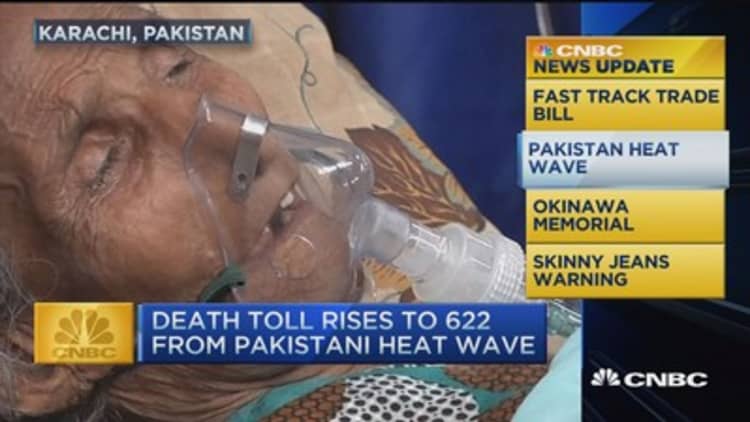A suffocating heat wave across Pakistan has killed over 700 in the past week, exposing a severe power crisis and threatening to usher in a new period of political unrest.
Temperatures have hit 45 degrees Celsius in recent days, prompting Prime Minister Nawaz Sharif to declare a national emergency this week. The blistering heat is exacerbated by chronic electricity shortages, forcing water pumping stations - the chief source of potable water - to come to a standstill, with residents also unable to seek relief from fans or air-conditioners. That's created a deadly health risk for Muslims fasting during the annual Ramadan holiday that began last week.
"This shortfall is the result of the failure, over successive governments' tenures, to invest enough to expand power system capacity," said a new report by the U.S. Institute of Peace (USIP), an independent and nonpartisan group.
Electricity deficits can exceed up to one-third of peak demand in Pakistan and cost more than 2 percent of gross domestic product annually, it added. Multiple factors like a physical shortfall, the financial inability of utilities to cover the cost of increasing supply and poor governance have contributed to the crisis.
Read MoreEl Niño cloudhangs over Asian stimulus
Indeed, structural weakness in the power sector remains a major growth constraint and an impediment to investment, Moody's sovereign analyst Anushka Shah told CNBC on Wednesday. However, the government is making progress, she noted.
"Over the last few years, they have taken steps to address the crisis, mainly by increasing tariffs to reduce subsidies and add capacity. We do recognize these policy efforts and would view the implementation of these reforms as credit positive."

Simmering violence
But as the heat wave reveals the extent of slow progress, protesters have taken to the streets. Citizens clashed with police forces this week after setting fire to offices of the Water and Power Development Authority in northwestern and southwestern towns, according to local news media.
"Pakistan's energy shortages disrupt daily life in the country, and protests and demonstrations against the shortages often turn violent, creating a risk that the energy crisis could threaten peace and stability," USIP warned.
The country is still recovering from a prolonged spate of unrest last year when cricketer-turned-politician Imran Khan demanded Sharif's resignation. Add in the omnipresence of Islamist militant groups and the result is a toxic mix for Islamabad.
The threat of renewed violence comes just weeks after Moody's upgraded the country's sovereign credit rating to B3 from Caa1 with a stable outlook, the first increase since 2008. While the firm applauded Sharif's progress in structural reforms, it warned that any political instability will be credit negative.
"Pakistan's fractious political environment is reflected in our rating. We will monitor the current situation but unless it gets out of hand, it shouldn't impact the B3 rating," said Moody's Shah.


